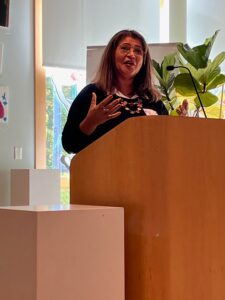EASTHAM — Katia DaCunha arrived in the U.S. with her two children in 2003 with five dollars to her name. She recalls meeting a police officer at the Miami airport who, despite not speaking her language, helped her exchange her Brazilian reais for dollars and use his cell phone to call her husband, who was waiting for her in Boston.

DaCunha calls that experience her welcome to America. She says the message was clear: she should never stop dreaming.
DaCunha told her story at the Eastham library on Nov. 7 where she was on a panel of people from immigrant and faith-based Cape Cod communities. State Sen. Julian Cyr and State Rep.-elect Hadley Luddy also participated. The forum was organized by the Nauset Interfaith Association, clergy and lay leaders from 24 local congregations whose mission includes working for the common good and standing with the marginalized.
Although the forum’s topic sounded simple enough — a response to the “fear and anger” the speakers had heard on Cape Cod in recent years regarding immigration — no simple answer emerged.
That wasn’t the goal, said organizer Tom Ryan. “Having a culture of welcome is a lifetime task,” he said.
“We have no idea what is coming but for sure it won’t be good,” said DaCunha at last week’s forum. “We have to plan for the worst.”
DaCunha is the founder of Latinx in Action, a Hyannis nonprofit dedicated to helping immigrants on Cape Cod. She says that trust in local law enforcement has been dwindling. Many of her clients don’t report crimes committed against them because they’re afraid of being sent back home, she says, and in the eyes of many immigrants any police officer could be an ICE agent.
“Many people didn’t have a good experience back home trusting the police,” DaCunha says. “So, they came to a country where they thought the law was something they could trust. But suddenly it’s not true.”
Empathy and Economy
Besides providing English classes and operating a food pantry on Saturdays, DaCunha’s organization runs support groups for immigrants, including for survivors of sexual assault and domestic violence. “We are all survivors from different traumas,” she says, naming violence, discrimination, and exploitation as common experiences among those who seek new lives here.
“We need to strengthen our connections and relationships to the immigrant community in times ahead,” said Sen. Cyr, who worried that a second Trump administration would be more skilled at advancing an anti-immigration agenda than the first. “It’s safe to say the forecast is pretty turbulent,” Cyr told the Independent after the session.
The library forum came less than 48 hours after Donald Trump was declared the winner of the presidential election, and panelists worried aloud about the promises of mass deportation that were a cornerstone of the Trump campaign. But this event was organized well before the election, said Ryan, after Cyr reached out to the interfaith group last spring to ask why they seemed to have gone quiet on immigrants’ rights.
“I might be missing it, but our friends who were active in supporting safe communities have seemed to be unusually silent,” Cyr wrote in an April email to Mike Hager, a member of the interfaith group. “It would be helpful for those folks to now help push back on the hate and rhetoric we see on a regular basis.”
Last fall, when shelters in Boston ran out of space and families were sent to live temporarily at the Harborside Suites in Yarmouth and the Ocean Park Inn in Eastham, a group led by Yarmouth resident Cheryl Ball protested outside her town hall with signs reading “Americans First” and “Citizens Before Illegals,” according to photographs posted online.
In recent years, the cultural and ethnic diversity of the Cape has increased, Luddy told the gathering. Massachusetts is home to the third largest Haitian population in the U.S. after New York and Miami, according to the Immigration Policy Institute, and Cyr said Haitians are among new immigrants to the Cape. Still, the shift is not dramatic here, where less than 10 percent of Barnstable County’s population is nonwhite, according to the Census Bureau.
Immigrants make up a large portion of the Cape’s workforce, especially during the summer, and according to Cyr, workers here on J-1 and H-2B visas frequently end up applying for green cards. Cyr said he now expects “quite a bit of uncertainty” regarding the availability of workers next summer.
Most immigrants come to Cape Cod for work and find themselves struggling to keep up with the rising cost of housing, said Luddy, who is the CEO of the nonprofit Homeless Prevention Council. She called for greater empathy: “It’s important to be empathetic and listen to a person’s background and situation. Often folks are jumping to conclusions about a person without understanding the nuances of what brought them where they are.”
A Role for Religious Leaders
At the end of the forum, Ryan asked those present to write down ideas for action. Later, he told the Independent that many of those ideas were about education, not just in schools, but in the community as well.
For Ryan, the role of faith communities in charting a response to anti-immigrant sentiment is obvious. He says he sees a “moral horizon” of “peace, hope, and love” on every page of the sacred texts of all the Abrahamic religions.
Ryan believes that the hope emphasized by religions is analogous to the hope immigrants like DaCunha bring with them to America. “Our goal is to recreate a climate of community amongst us here on Cape Cod,” he says. “That includes homeless, refugees, immigrants, tourists, and vacationers.”
DaCunha agreed, saying religious leadership is essential during times of uncertainty. “Leaders should be walking side by side with us,” she says. “There’s so much going on, and we need them to be present.”



